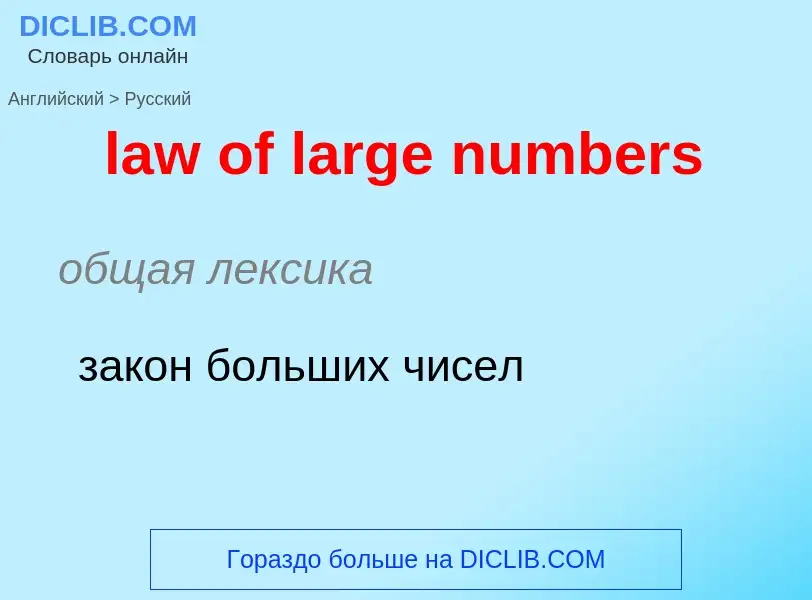Перевод и анализ слов искусственным интеллектом ChatGPT
На этой странице Вы можете получить подробный анализ слова или словосочетания, произведенный с помощью лучшей на сегодняшний день технологии искусственного интеллекта:
- как употребляется слово
- частота употребления
- используется оно чаще в устной или письменной речи
- варианты перевода слова
- примеры употребления (несколько фраз с переводом)
- этимология
law of large numbers - перевод на русский
общая лексика
закон больших чисел
закон больших чисел
[kwɔ'drili(ə)n]
общая лексика
квадриллион
существительное
общая лексика
единица энергии
эквивалентная квадрильону британских тепловых единиц (или количеству теплоты, получаемому от сжигания 24 млн. т нефти)
математика
септильон (
квадрильон, миллион в четвертой степени (единица с 24 нулями)
американизм
квадрильон (
тысяча в пятой степени (единица с 15 нулями)
[nɔ'niljən]
общая лексика
нониллион (в Англии - 10*54, в США - 10*30)
существительное
общая лексика
нониллион
число 1033 (в США и Франции)
число 1054 (в Великобритании)
[di'siljən]
существительное
общая лексика
дециллион (1060
[амер.]
Определение
Википедия
In probability theory, the law of large numbers (LLN) is a theorem that describes the result of performing the same experiment a large number of times. According to the law, the average of the results obtained from a large number of trials should be close to the expected value and tends to become closer to the expected value as more trials are performed.
The LLN is important because it guarantees stable long-term results for the averages of some random events. For example, while a casino may lose money in a single spin of the roulette wheel, its earnings will tend towards a predictable percentage over a large number of spins. Any winning streak by a player will eventually be overcome by the parameters of the game. Importantly, the law applies (as the name indicates) only when a large number of observations are considered. There is no principle that a small number of observations will coincide with the expected value or that a streak of one value will immediately be "balanced" by the others (see the gambler's fallacy).
The LLN only applies to the average. Therefore, while
other formulas that look similar are not verified, such as the raw deviation from "theoretical results":
not only does it not converge toward zero as n increases, but it tends to increase in absolute value as n increases.

![''Bottom:'' With an enormous number of solute molecules (too many to see), the randomness is essentially gone: The solute appears to move smoothly and systematically from high-concentration areas to low-concentration areas. In realistic situations, chemists can describe diffusion as a deterministic macroscopic phenomenon (see [[Fick's law]]s), despite its underlying random nature.}} ''Bottom:'' With an enormous number of solute molecules (too many to see), the randomness is essentially gone: The solute appears to move smoothly and systematically from high-concentration areas to low-concentration areas. In realistic situations, chemists can describe diffusion as a deterministic macroscopic phenomenon (see [[Fick's law]]s), despite its underlying random nature.}}](https://commons.wikimedia.org/wiki/Special:FilePath/DiffusionMicroMacro.gif?width=200)

